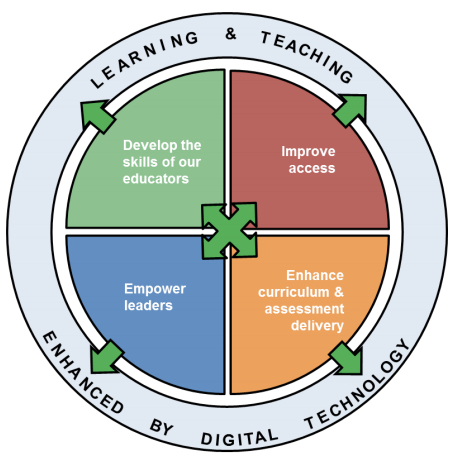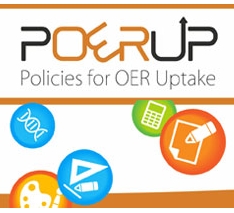Last week the ALT Scotland Special Interest Group hosted the second Open Scotland event, Open Education, Open Scotland at the Informatics Forum at the University of Edinburgh. This free and open event was attended by sixty colleagues, and speakers represented every sector of Scottish education including schools, further education, higher education and government.
A recording of the event livestream, courtesy of Martin Hawksey of ALT, is available here: morning livestream, afternoon livestream, and there is a storify of tweets, links and presentations here: Open Education, Open Scotland Storify.
Open Education, Open Scotland – Joe Wilson, Scottish Qualifications Authority
The event was opened and introduced by Joe Wilson of the Scottish Qualifications Authority and the ALT Scotland SIG. Joe suggested that universities in Scotland are currently in a very privileged position, but warned that the relationship between learners and institutions is changing. Meanwhile the college sector has been comprehensively restructured but there is a danger of loosing the focus on the learner in the midst of restructuring. Joe asked where are the attempts to look at new models of assessment? Employers want to see that rich portfolio of experience that differentiates students as individuals. He also asked, what can we do to encourage community learning and digital participation? A citizen without a browser is now at a disadvantage as Government moves online by default. Joe challenged delegates to think out of the box in terms of resources, assessment, and credentials and asked how can we open up access to resources to empower disadvantaged learners?
Open Scotland, Open ALT – Maren Deepwell, ALT
Maren provided an update on ALT’s collaboration, strategy and partnerships. With a slide of Glasgow School of Art’s now destroyed Mackintosh Library, Maren gave us a timely reminder that not all we care about is digital, people are at the heart of what ALT do. Maren also flagged up some good examples of sharing and open practice including ALT’s ocTEL online course and the Scottish Open Education Declaration from Cetis and Open Scotland.
Scottish Government Perspectives – Colin Cook, Deputy Director of Digital Strategy, Scottish Government
Colin introduced the Scottish Government’s Digital Strategy and focused on the role of the Digital Directorate to bring coherence to digital and ICT initiatives. The Scottish Government has a policy commitment to build a world class digital Scotland and recognises that digital participation offers an opportunity to challenge ingrained inequalities. The Government wants to provide opportunities for people to move up the digital skills pathway, but it’s important to focus on learning, not just assistance. Third sector organisations have a huge role to play due to the position of trust they have with the digitally excluded.
The government is committed to driving forward digital transformation across the public sector and recognises the need for industry partnerships with education to develop a digital skills academy. Colin acknowledged that wider use of data is critical to the Government’s long term vision of delivering effective public services, but added that safeguards are in place to promote public confidence so that people can be comfortable with how data is being shared.
SFC and OU update – David Beards, SFC and Ronald MacIntyre, OU
Learning technology is high on the funding council agenda at the moment. MOOCs currently dominate the policy rhetoric, but this is well understood and the importance of pedagogy is always there in the background. Jisc is still the biggest thing that SFC funds and they are committed to the open agenda so it is up to everyone in the sector to let Jisc know what we want them to do.
SFC is providing the Open University with £1.27 million over three years to raise awareness of open education practice and support the sector’s capacity for online pedagogy. The new “Open Project” will develop an online hub to share best practice, produce a small number of high quality OERs of particular benefit to Scotland, and evaluate various economic models for openness. The outputs of the project will be very much in accordance with the activities undertaken by Open Scotland over the last year.
Open Badges, Open Borders – Suzanne Scott, Borders College
Suzanne presented Borders College’s innovative use of open badges. Borders College’s journey started with a Moodle open badges pilot but following a chance discussion with the head of human resources, the initiative has now spread. Open badges are now used to engage with staff and have replaced all staff CPD paper certificates. The use of badges for staff has increased loyalty and attendance at CPD sessions.
Phonar Open Courses – Jonathan Worth, Coventry University
Jonathan related his experiences of rethinking the business model behind photography and opening access to his Coventry University photography course. The course, Phonar, expanded from 9,000 to 35,000 people over a thirteen-week period prompting a mixed response from the university. Institutions hear “open” and they think “free”, but talk about “connected” and they see business opportunities. Connections mean networks and opportunities. Photographs are not the product, but digital fluency is an extremely valuable product. Jonathan also warned “If you think your product as a teacher is information, you’re going head to head with the internet. Good luck with that!” Jonathan also introduced Phonar Nation, “The biggest youth photography class in the world”.
Exploring the Digital University – Sheila MacNeill, Glasgow Caledonian University
After our scheduled speaker was unfortunately unable to attend, Sheila kindly agreed to step in at the last minute to talk about research she and Bill Johnson have been undertaking on exploring the digital university. Sheila presented four key themes for digital universities: digital participation, information literacy, learning environments, and curriculum and course design. She noted that universities’ civic roles can change quite profoundly through digital technology and urged us to think about the interface of digital and physical interaction. Sheila also referred to Edinburgh Napier University’s Digital Futures project and talked about mapping digital literacy and residency across different university services. Wrapping up her presentation Sheila questioned whether being an open practitioner was a “luxury” or a “daily necessity” for colleagues across the sector.
Opening GLOW – Opening GLOW – Ian Stuart and John Johnston
GLOW initially started life as a national schools intranet in 2001, now Glow is about unlocking the benefits of the internet and providing learning opportunities. For some time GLOW seemed clunky and unworkable but in 2010 wikis and forums were added. Identity management should be core to GLOW services and accommodating BYOD has to be part of the GLOW landscape. John and Ian acknowledge that there’s still lots of work to do with GLOW, but also plenty room to manoeuvre and to encourage teachers to become open educators. We need to encourage teachers to open up in as many ways as possible, the technology is the easy bit, culture is harder, and we need help from folk further along the road.
The Scottish Open Education Declaration – Lorna M. Campbell, Cetis
Lorna introduced the Scottish Open Education Declaration a community initiative launched by Cetis and Open Scotland. Based on the UNESCO Paris OER Declaration, the Scottish Open Education Declaration has a wider scope as it focuses on all aspects of open education practice, not just open education resources. The declaration also includes a clause on supporting the use of open source software in education. A key aspect of the declaration is the focus on education as a public good. The declaration is an open CC licensed public draft and all colleagues are invited to contribute. A large number of comments have already been received, points that have been raised include, changing the focus of the declaration so that technology is viewed as an enabler rather than a driver, the need for an open culture shift and the necessity of capacity building, the importance of sharing and education sectors and stronger commitments to open licensing. The first draft will remain open for comment for another month, then comments will be edited into the document, and a second draft posted for further discussion.





